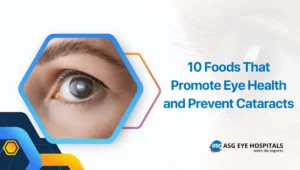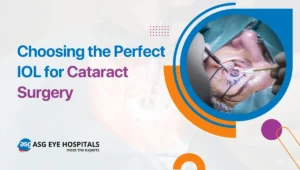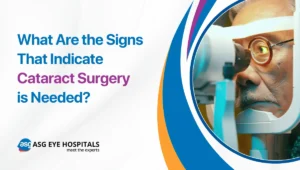Cataracts are a common age-related eye condition that affects millions of people worldwide, causing clouding of the lens and leading to vision impairment. While surgery is the most effective eye cataract treatment, eye drops can play a crucial role in managing symptoms and potentially slowing down the condition’s progression. This blog post will delve into what you need to know about eye drops for cataract treatment.
Can Eye Drops Treat Cataracts?
Currently, it is not possible to treat cataracts with eye drops. There are many headlines about eye drops to treat or dissolve cataracts but they do not dissolve cataracts they can improve other aspects of vision or potentially reduce the cataract’s progression.
Surgery remains the primary treatment for cataracts, some eye drops may be prescribed to address specific symptoms or slow down the condition’s progression.
Research on several drugs is still ongoing that could help dissolve cataracts via eye drops one day.
Reasons, Why Eye Drops For Cataracts Are Not Available Yet
- Researchers are still figuring out the best chemical for treating or preventing cataracts in humans.
- An eye drop can’t really get enough medicine to the lens because it’s inside your eye.
- Researchers need to make sure that any chemicals that touch or enter your eyes won’t hurt your eyes or overall health.
It’s hard to know when (or if) eye drops for cataracts will be ready to use, but there’s been promising research in recent years.
Typically, some eye drops that may be prescribed to address the specific condition that may occur with cataracts are categorized into two parts:
- Anti-inflammatory Eye Drops: Inflammation commonly occurs with cataracts, and anti-inflammatory eye drops can help manage this aspect of the condition. These drops may contain corticosteroids or nonsteroidal anti-inflammatory drugs (NSAIDs) to reduce inflammation and alleviate discomfort.
- Preservative-Free Artificial Tears: Cataracts can cause dryness and irritation in the eyes. Preservative-free artificial tears provide lubrication and relieve dry eye symptoms. These drops can be especially helpful for individuals experiencing dry eyes as a result of cataracts or after cataract surgery.
Potential Benefits and Considerations:
- Symptom Relief: Anti-inflammatory eye drops can provide relief from symptoms such as redness, irritation, and discomfort associated with cataracts.
- Delaying Progression: Some research suggests that certain eye drops may have the potential to slow down the progression of cataracts. However, more studies are needed to establish their effectiveness definitively.
- Preparation for Surgery: Using prescribed eye drops before cataract surgery can help manage inflammation and ensure a smoother recovery process.
- Side Effects: It’s essential to be aware of potential side effects of prescribed eye drops, including stinging, burning, or temporary blurred vision. If these symptoms persist or worsen, it’s crucial to consult with your eye care professional.
- Consultation with an Eye Care Professional: Before using any eye drops for cataract treatment, it’s crucial to consult with an eye care professional. They can assess your specific condition, prescribe the appropriate eye drops, and provide guidance on proper usage.
Future Medication For Cataracts Could Include
- Lanosterol
- C-KAD
- Antioxidant eye drops
- N-Acetyl carnosine
While eye drops cannot remove cataracts, they can play a supportive role in managing symptoms and potentially slowing down the condition’s progression. If you suspect you have cataracts or have been diagnosed with them, consult with your eye care professional to determine the most suitable treatment plan, which may include the use of prescribed eye drops. Taking proactive steps in managing cataracts can contribute to maintaining good eye health and quality of life.



